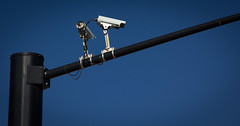 |
| Traffic Cameras (Photo credit: Dave Dugdale) |
Since 2009, the city of Baltimore has collected more than $70 million in fines from cameras designed to catch speeders. Statewide, more than 2.5 million tickets have been doled out. But both Baltimore City and the state of Maryland’s speed camera systems are seriously flawed, sending tickets to people who weren’t speeding and doing little more than causing headaches for drivers.
The Baltimore Sun reported a few weeks ago on their in-depth investigation into the cameras, finding the system of speed cameras is wrought with problems—problems the city is well-aware of but still they stand with hands outstretched to collect on the fines.
The city has led citizens to believe that when they get a ticket from one of these cameras, they are to pay it, plain and simple. That there is no viable process for contesting it. After all, it’s a computerized machine and they don’t make mistakes, right?
But, the system does make mistakes, and plenty of them. Nearly 6,000 tickets have been “deemed erroneous” by city officials because the cameras were miscalibrated or malfunctioning. But we don’t know how many more tickets were erroneous and never contested, as many people just mail in a check rather than deal with the headache of challenging the ticket.
Also, the tickets generated from these machines usually don’t hold up in court because of “glitches in the data” or the prosecution’s inability to produce evidence. Most citizens don’t realize that in addition to the photo these cameras take, they also take videos that can often be used to exonerate you in court.
Citizens aren’t the only ones critical of the system, several area judges have criticized it in open court.
“With so many problems being reported with the city’s system, the integrity of the program is called into question,” said Regina Averella of the AAA Mid-Atlantic. “It’s difficult for motorists to have faith in the system and believe it’s not about raising money instead of saving lives as it was intended.”
And with so many questions about the cameras’ reliability, one has to wonder if the city cares how they are working, and would just rather have people shut up and pay up. It seems Mayor Stephanie Rawlings-Blake would like nothing more than that, telling people to simply obey the speeding laws if they don’t like it, calling the tickets a “minor inconvenience.”
While speeding tickets may seem like a minor concern—too many can cause you to lose your license. And if you are speeding too fast, you could be charged with a criminal traffic offense.

 When Cops Use Cameras Too
When Cops Use Cameras Too
